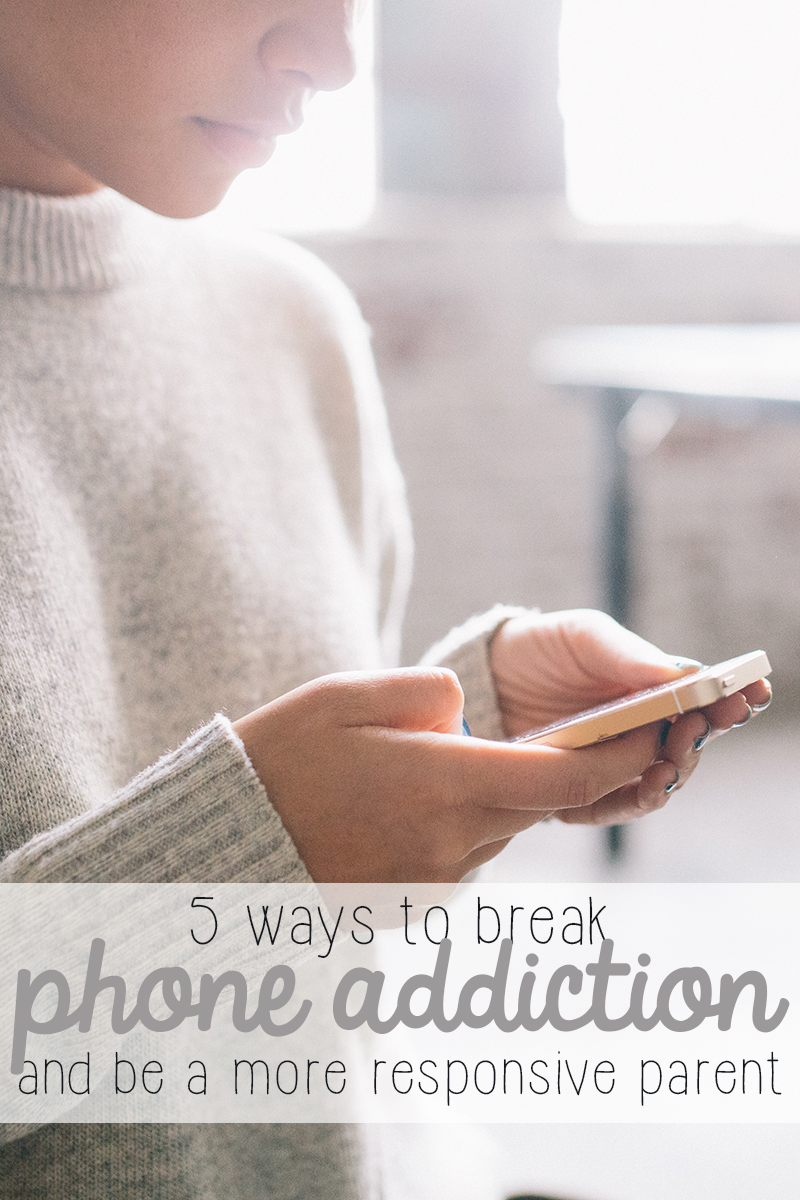I was checking my emails. The phone had just buzzed, and I switched from Instagram over to my Gmail to check an email from a work contact. It seemed innocent enough. And then I heard my son say “Mom. Look. Please look.” What started as a momentary distraction to post a cute photo of him turned into a much longer journey through posting the photo, crafting a perfect caption, adding hashtags, liking friends’ recent photos, and then switching over to read emails. It wasn’t intentional– I wasn’t trying to give up attention to focus on my phone. But I had unintentionally stopped watching my son’s craft project because I had stopped to post “just one photo” and gotten lost in my phone again.
Even parents with the best intentions sometimes get so lost in their phone that they forget to take notice of the things that really matter. These 5 tips, when applied with intent and purpose, again and again, will help you break that cycle of phone addiction and learn to embrace reality. And I’m not just preaching at you on this one– I’m talking to myself, too.
Set a time limit. Getting on your phone to check your facebook or emails? Start by going to your timer app (on many phones, it’s within the “clock” app) and setting a specific time– 5 minutes, perhaps– and hitting “start.” Once you’ve done that, browse as you please, but when that timer goes off, it’s time to stop and put the phone down. It doesn’t matter if you’re in the middle of an awesome Buzzfeed Quiz, the massive album of pics from your best friend’s vacation, or the latest gossip on your town’s local facebook group… it’s time to stop and focus on the world right in front of you. A timer will help you manage your time (and also learn to realize how quickly time flies when you’re on your phone). How many times have you sworn you were just going to check one thing really quickly, and found out that you’d lost 30 minutes in the world of your phone? This will snap you out of that timesuck and realize how much time has passed, and when it’s time to move on.
Create a Designated “Cell Phone Space” and only use your phone there. Don’t make it convenient, like a cozy chair. Make it harder– a space near your corner cabinet, a place where you always have to stand up, the other side of the room from where you keep your work tasks. Only check your phone there, and you’ll quickly get tired of standing up, leaning on a cabinet, or having to walk back and forth to use your phone. By making a “default space,” you get the phone out of your hand and pocket, and worry less about every single notification; if you have to walk across the room, or worse yet, to another room, are you going to go every time you hear a notification, or are you going to save that trip for several notifications to pile up or wait for a call or a notification that matters. Pro tip: If you are getting work emails or things you MUST reply to, see if you can change the notification tone on those specific items to make sure you don’t miss the truly important things. Alternately, set your phone to mute notifications for Facebook and other social apps, then leave it on for important things like your work email.
Designate no-phone spaces and times. For example, we have a rule at our house that there are no phones allowed during family dinner. It doesn’t matter if we’re at a restaurant or at home, dinner time means phones are put away, including the home phone. Any call, text, or post can wait the 30 minutes to an hour that family dinner takes. Perhaps your family does family game nights, or has a designated room for studying or homework… designate those spaces or times as being phone-free, and you’ll see distractions reduce drastically. Better yet, make your child’s play space phone-free so you can take time to interact with them. Major tip: don’t keep your phone in your bedroom; it can mess with your sleep cycle! (P.S., I’m preaching to myself here, too– I’m guilty of sleeping with my phone!)
Delete the apps you’re most addicted to, cold turkey. If you can’t stop checking your Facebook or keep checking your crops on Hay Day, it’s time to make a clean break and delete the app. For apps like Facebook, just make the decision that all of your communication can wait until you’re physically at a computer– that means cutting off messenger or the groups app. Perhaps you’ve got a nasty Twitter habit… delete it off of your phone, and visit it on the computer only. Can’t bring yourself to delete the apps completely? Put all of the apps you’re hopelessly addicted to in a folder on your phone, then turn off the push notifications so you won’t be notified every time something happens. Once you’ve done that, go back to rule one and Set a Time Limit or rule two and Set a Specific Phone Place.
Press “Pause” on Photo Shoots. If you’re an obsessive Instagrammer, recognize and set limits. Instead of shooting photos and videos throughout the entire adventure or day, take one special photo, then put the phone away for the rest of the trip. Further, whether you’re taking one photo or deciding to take a few extras, don’t feel pressure to post them right that minute… it’s okay to “latergram” your photos– take them now, and upload them once you get home, or once you can upload at a time you’re not missing the moment (like before bed). That way, you’re focused on that great trip to the science museum, that fun story your child is telling, or that shining moment during the school program, instead of trying to craft the perfect set of hashtags.
It can be hard to break away from your phone and focus on the things that matter. And no, this doesn’t mean you need to ditch the phone entirely– obviously, all things in moderation. Smartphones can be amazing tools for connecting with your loved ones; just don’t mistake the connections you’re making online as being more important than your connections in person, like spending time with your kids. If you’ve got your nose in your phone, you’re missing out on some really exciting things. It took a gentle nudge from my son to remind me that the phone has it’s time and place as a great tool in life, but that it isn’t the most important thing. And no, this advice doesn’t just go for phones… the iPad, Kindle, or whatever other device you have can be just as addicting.
This year, my word of the year is “Embrace.” Part of that involves embracing change, and embracing family. Because of that, I’m resolving to be more mindful of my phone use, and aim to put the phone down more often. I won’t be perfect. I won’t follow all of these rules seamlessly. I’ll probably make excuses as to why I shouldn’t follow them at all. But change takes time, and effort, and intention, and I’m intending to work harder to embrace reality, and take breaks from my smartphone, if only for a few extra minutes a day. I’d love it if you would join me on this journey. Let me know in the comments below what you’re thinking, and tell me what your biggest struggle with putting the phone down is.
Please keep in mind that I’m not saying smartphones are bad. Smartphones are amazing, awesome things. But it’s all about moderation and using smartphones as an effective tool, not our whole lives in the palm of our hands. Happy 2016!





